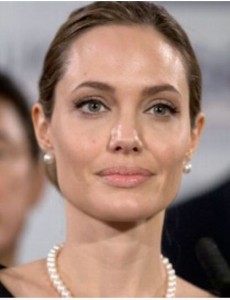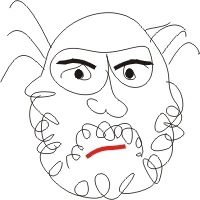“We merely hold that genes and the information they encode are not patent-eligible … simply because they have been isolated from the surrounding genetic material,” … Clarence Thomas

Click Angelina Jolie’s image to read about the deaths of her mom and aunt from BRCA related cancers.
This morning the Supreme Court ruled that human genes cannot be patented! The decision, written by Justice Clarence Thomas, said that the company, . “Myriad did not create anything,”… “It found an important and useful gene, but separating that gene from its surrounding genetic material is not an act of invention.” The ruling was unanimous.
The effects on biology and other basic sciences may be immense. Since 1984, the U.S. Patent and Trademark Office has granted more than 40,000 patents tied to genetic material. Myriad has used its patent to test a million women for mutations that often lead to breast and ovarian cancer. The price, about $4.000, is obviously a big source of income for the Utah company. Sales of its Myriad’s tests have soared, fueled by patents which give Myriad a virtual monopoly on genetic testing for hereditary breast cancer in the U.S. About 227,000 American women are diagnosed with breast cancer every year and about 5 to 10 percent carry the mutant genes.T he ACLU argued that discovering a gene is not creating “a new molecule that had never been known to the world,” as claimed by Myriad.
Justice Sonia Sotomayor said. “It’s just nature sitting there.”
- Mary-Claire King, a geneticist now at the University of Washington, stunned the scientific world in 1990 by proving that a single gene can raise the risk of breast cancer. Backed by venture capital money, Myriad beat King and her academic colleagues by pinpointing the location of the gene and patenting it.
The story has special relevance to the UW. Mary Clair King, of the UW Dept. of Genome Sciences , discovered this gene in 1990 while she was a Professor at UC Berkeley. The gene, BRCA1, is located on chromosome 17, and is responsible for as many as 5-10% of all cases of breast cancer. Discovering the gene, that is knowing where it is in the genome, meant that the next step was discovering the actual sequence in the genome. A race ensued and .. work done by Myriad formed the basis for its claim to a patent. The video on the right show Mary Claire’s reaction when she learned that Myriad had sequenced BRCA1.
BRCA1 is not the only breast cancer gene. In 2010, the University of Washington, in an effort led by Dr. King, introduced a more effective and less expensive tests including including 40 genes. However, faced with Myriad’s patent, the UW had to remove the BRCA genes .
“Every time a woman dies of breast or ovarian cancer who turns out to have a mutation in BRCA1 or BRCA2, or any of the 20 or so sister genes, I feel in a way that it’s on us,” King said when she was president of the American Society of Human Genetics,
 There is another issue that affects all faculty .. that s the right of the public to know what ITS academics have learned. Given its now failed claims at patent rights, Myriad acted like any private corporation and restricted data it gained from testing. Myriad’s discovery, however, depended on work done in public by Dr. King and others funded by public funds. This seems grossly wrong. It seems to me there ought to be a law that information derived from publically funded research, even if that work is patentable, should be placed in te public domain.
There is another issue that affects all faculty .. that s the right of the public to know what ITS academics have learned. Given its now failed claims at patent rights, Myriad acted like any private corporation and restricted data it gained from testing. Myriad’s discovery, however, depended on work done in public by Dr. King and others funded by public funds. This seems grossly wrong. It seems to me there ought to be a law that information derived from publically funded research, even if that work is patentable, should be placed in te public domain.